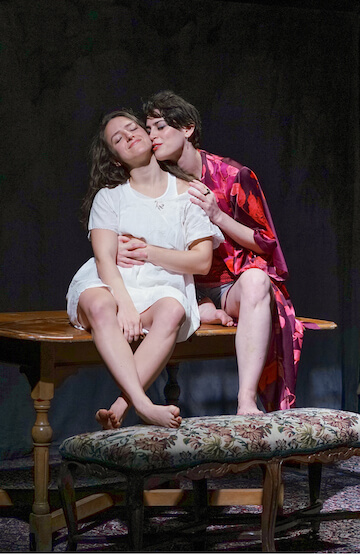Shayna Schmidt and Melissa Weisz in Sholem Asch’s nearly century-old “God of Vengeance,” performed in Yiddish with English supertitles at La MaMa through January 22. | RONALD L. GLASSMAN
Last spring, Paula Vogel’s “Indecent” at the Vineyard Theatre was received with such rapture that producers soon announced a transfer to Broadway — it’s now slated for the Cort Theatre starting in April.
Not that the searing historical drama, chronicling the turbulent backstory of a controversial play from the early 20th century titled “God of Vengeance,” screams commercial hit. Originally written in Yiddish by Sholem Asch, “Got Fun Nekome” features Jewish prostitutes, a desecrated Torah, physical abuse of women, and the first-ever lesbian kiss on a Broadway stage.
In 1923 these acts were deemed so egregious that the producers and entire cast of the Broadway version were arrested and charged with lewd behavior. Many Jews were irate that their people were being depicted as unsavory stereotypes.
And now theater history geeks are in for a treat. The New Yiddish Rep is staging a rare revival of “God of Vengeance” in Yiddish (with English supertitles) at La MaMa, around the corner from the very theater where it premiered in 1907.
Rare revival of “indecent” play depicting a forbidden lesbian romance, in Yiddish
The incendiary plot revolves around Yekel (Shane Baker), a loutish, moody Jewish man who runs a brothel in the cellar of his house. To atone for his sins and raise his standing in the community, he commissions a Torah scroll to be written and placed in the bedroom of his virginal 17-year-old daughter, Rifkele (Shayna Schmidt). He wants nothing more than to keep Rifkele pure and marry her off to a respectable Jewish scholar. His schemes, however, quickly go awry.
Does dusting off the century-old source material for “Indecent” — in a nearly dead tongue, no less — make for satisfying theater? Based on this modest, uneven production, the answer is both yes and no.
On the plus side, this earnest staging powerfully articulates themes such as the hypocrisy of religion, the pressure to keep up appearances, the curse of inheriting sins from parents, the importance of following your heart, and the value of keeping the pure separate from the impure.
“You want to talk business with me? All right, but downstairs,” Yekel says to a pimp at the brothel who has come uninvited to his home upstairs. “Every dog must know his own place” is one of his favorite aphorisms.
The authentic beauty of the Yiddish language, so colorful and expressive, enriches the drama. The supertitles are well done and the action is easy to follow. In addition, the dialogue has been wisely streamlined, cutting the running time to a manageable 95 minutes with no intermission. Each of the three acts ends with an emotional wallop.
The strongest performance is turned in by Eleanor Reissa (who also directs) as Yekel’s wife, Sarah. She imbues the dutiful, beleaguered Sarah, a former whore, with a sense of stoic dignity. Also notable is Melissa Weisz as Manke, the prostitute who seduces Rifkele. Instead of behaving like a predator, Weisz’s Manke makes it clear that she truly loves the yearning teenaged girl. Their stolen night of intimacy is profoundly stirring, the most honest scene in the entire play.
Unfortunately, this endeavor fails to tamp down the artifice and melodrama inherent in the original text. Nor is it able to fully convey the poetic realism as intended.
The time period is nebulous — perhaps to underscore the universality of the ideas — but the mix of styles is jarring. The drama vaguely seems rooted in the early 20th century, but why is that prostitute holding a clear plastic umbrella? And why is Rifkele wearing giant headphones? The cluttered, semi-realistic hodgepodge of a set should be scrapped in favor of a cleaner, stripped down approach.
To be sure, the New Yiddish Rep should be lauded for bringing this relic back into the spotlight, reminding us that Yiddish theater still can have a meaningful place in today’s theatrical landscape. And that the poetic yet near-extinct Jewish language deserves to be kept alive. This “God of Vengeance” makes for a compelling albeit flawed companion piece to the infinitely more polished “Indecent.”
GOD OF VENGEANCE | New Yiddish Rep | Performed in Yiddish with supertitles | La MaMa Theatre, 74A E. Fourth St., btwn. Bowery & Second Ave. | Through Jan. 22: Wed.-Sat. at 7 p.m.; Sat.-Sun. at 3 p.m. | $36 at NewYiddishRep.org or 800-838-3006 | 95 mins., with no intermission



































